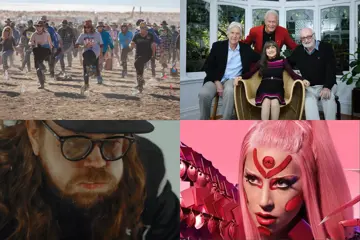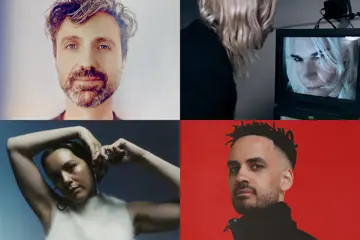Beyonce slayed Coachella – making history as the first black woman to headline. And, in 2018, the female stars of R&B and hip hop are at the forefront of popdom.
The mercurial Cardi B, who also performed at Beychella, is the hottest rapper in the game. Following last year's mega-hit Bodak Yellow, Cardi's debut album, Invasion Of Privacy, has topped the US charts. It's a critical success, too. Cardi is living her dream – she's engaged to Migos' Offset and expecting their child. But old barriers still exist for pop's women of colour.
Despite being proclaimed 2014's best avant 'n' B act with Aquarius, Tinashe was sidelined. Her sophomore, Joyride, was endlessly delayed as RCA Records prioritised Zayn – the star ruing as such publicly. Tinashe lost traction as the artists she presaged – SZA, Kehlani and Kelela – all blew up.
In the '80s, Madonna redefined pop for women. The provocateur ushered in a postmodern feminism centred on the body by subverting female archetypes (the whore/virgin binarism) and harnessing sexuality as a form of empowerment. Alas, Madonna faced a massive backlash after 1992's album Erotica – and Sex, a pornographic coffee table book (with rappers Big Daddy Kane and Vanilla Ice as models!). She had challenged one taboo too many. Still, Madonna started a movement – with Janet Jackson claiming her sexual liberation on 1993's Janet.
In fact, the R&B icon Millie Jackson introduced black female sex positivity, and pioneered rap, in the early '70s. With the rise of the urban music scene, black female acts like Salt 'N Pepa developed this streetwise sexuality to parallel, or counter, the hyper-masculinity of hip hop and New Jack Swing. Adina Howard aired 1995's nasty G-funk classic Freak Like Me. The next year, Brooklyn's Lil' Kim, mentored by The Notorious BIG, became hip hop's first female 'playa' with her debut, Hard Core. The OG Queen Bee raised the ire of Civil Rights activist C Delores Tucker, who tagged her music "gangsta porno rap".
Don't miss a beat with our FREE daily newsletter
In turn, Kim opened the way for Nicki Minaj – rapper, singer and auteur. The Queens native broke out as a quirky, individualistic MC, with a myriad of alter egos and a predilection for flamboyant costumes and wigs. Her theatricality elevated Kanye West's My Beautiful Dark Twisted Fantasy. But, post-Pink Friday, Nicki would lean towards glossy hip-pop – albeit bringing the raunch with Anaconda. Then, in 2013, Beyonce manifested her emboldened sexuality on a stealthed eponymous album.
Mind, corporeal feminism is inherently paradoxical. Second-wave feminists accused Madonna of objectifying herself. Are those female artists revelling in their sexuality not inadvertently facilitating its commodification, and co-option, by the patriarchy? Or is to suggest as such rather diminishing their agency? And what does all this mean for black and ethnic women?
The white mainstream media has long supported one or two black female pop acts while neglecting others, rendering the entertainment industry ever more inequitable. In 2017's viral interview with The Guardian, Tinashe observed, "There are hundreds of [male] rappers that all look the same, that sound the same, but if you're a black woman, you're either Beyonce or Rihanna. It's very, very strange."
In R&B, the turnover is high – Adina, Ashanti and Amerie have all been marginalised. In hip hop, rivalry is part of the entertainment – the culture itself predicated on battles. Any dramz is exploited for marketing campaigns. In the digital age, the industry, media and, yes, fans fuel rivalry between performers. The phenom is often generational – but it's also gendered. In the '90s, Lil' Kim feuded with Foxy Brown. Later, Kim made jabs at that 'upstart' Nicki Minaj for biting her steez. Latterly, Cardi B has been matched against Nicki – their beef centring on how Migos' hit MotorSport with her and Nicki as guests came to fruition. The micro-controversy has been dissected in op-eds and timelines. Nicki might well be offended by Cardi – but, considering that she's promoting the street singles (and ostensible Cardi missives) Barbie Tingz and Chun-Li ahead of a comeback, she surely has Cardi Beez In The Trap. This round.
Cardi has intuited these cultural dynamics. The Latina from The Bronx found fame when, as a stripper, she accrued a huge social media following with her uncensored feed – leading her to join the reality TV series Love & Hip Hop: New York. Few had great expectations as Cardi launched a rap career – even as she circulated 2016's solid mixtape Gangsta Bitch Music, Vol 1. Early last year Cardi inked a deal with Warner and, in June, unleashed Bodak Yellow. Some then questioned whether she wasn't a fluke. Yet Invasion Of Privacy shows Cardi's range with both her trademark trap bangers and introspective joints. Indeed, she drops clever and comic punchlines, while ruminating on her experiences in love and life as Belcalis Almanzar. With its sub-themes of surviving infidelity, economic independence and sexual freedom, Invasion… has the feminist fizz of LEMONADE. In an era of mumble rappers, Cardi is a credible spitter. She tells her 'Binderella' story on the compelling preface Get Up 10 (curiously sampling Nicki's ex, Meek Mill). And Cardi holds her own with Chance The Rapper on Best Life. She fires a final shot at the haters on I Do (with SZA): "They said by now that I'll be finished, hard to tell (I can tell)/My little 15 minutes lasting long as hell, huh?"
Like Cardi, Tinashe's entry into music was unconventional – but she's struggled. The Californian initially gigged as a kid actor, her most recognisable role in Charlie Sheen's sitcom Two And A Half Men. After a spell in the girl group The Stunners, Tinashe taught herself bedroom production and circulated mixtapes — she actually worked with buzz Canadian Ryan Hemsworth. Signing to RCA, the singer formulated a fresh trap 'n' B for Aquarius – charting with DJ Mustard's clubby 2 On alongside ScHoolboy Q.
Inevitably, Tinashe was compared to Janet Jackson, Aaliyah and Beyonce. But, though critically acclaimed, Aquarius didn't sell. Building her profile, Tinashe cameoed extensively: duetting on a remix of Britney Spears' reggae bop Slumber Party (accompanied by a suggestive Erotica-inspired video) and enjoying a smash with UK dance duo Snakehips and Chance The Rapper in All My Friends. In 2015 Tinashe rolled out a Joyride trailer on YouTube – but the LP didn't materialise. She cancelled her second Aussie tour to rejig it. Meanwhile, Tinashe shared a series of generic singles (with big-name male artists) that flopped. The talented dancer likewise sexed-up her image. Issued in January, Tinashe's acerbic trap banger No Drama, with influential guest Offset, would be the latest of several lead singles (the first, Player, featuring Chris Brown, was a hit in Oz).
Now released, Joyride will possibly disappoint fans of Aquarius. Tinashe envisages herself as "a pop artist who makes R&B-tinged pop music." However, in 2018, she's chasing trends, not generating them. Stuck With Me, her much-canvassed collab with hipster raves Little Dragon, sounds like a missing Major Lazer trop demo destined for MO. Tinashe dazzles when she ventures out – self-producing Joyride's intro, Keep Your Eyes On The Road. Helmed by Hit-Boy, the title-track (which Rihanna nearly nabbed for ANTI) has an industrial edge. The cyber-dancehall Faded Love, featuring Future, is the strongest single – harking back to Aquarius with StarGate's slickest beats. Most progressive is the bluesy Salt. And Tinashe flexes her diva vocals on the piano power ballad Fires & Flames. Tinashe should be a superstar – just give her the room.















